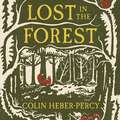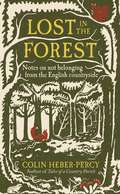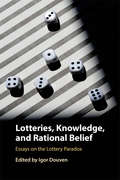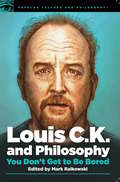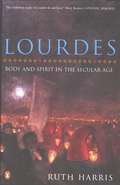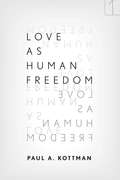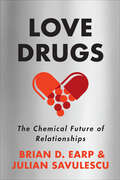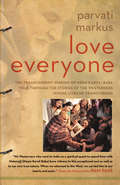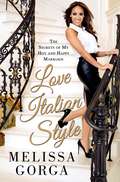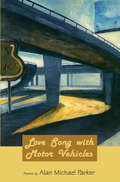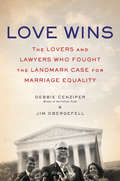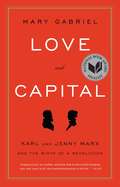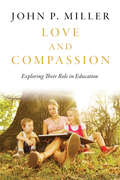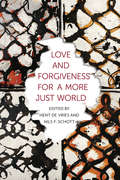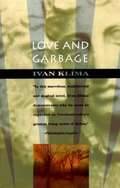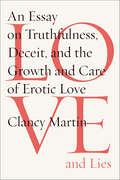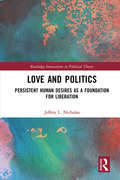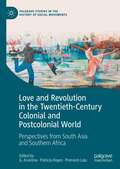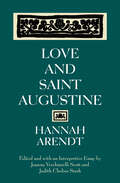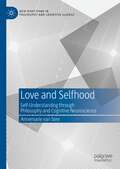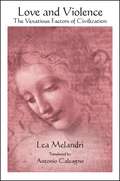- Table View
- List View
Lost in the Forest: Notes on not belonging from the English countryside
by Colin Heber-Percy'Colin Heber-Percy is a reliable guide' - THE REVEREND RICHARD COLESWhere am I? Who am I? And why didn't I bring a sandwich...?This book is a hymn to getting lost. Drawing on his experience as a troubled schoolboy, a burnt-out screenwriter at the BBC, an 'awkward' priest in the Church of England, Colin Heber-Percy reflects on the value of not belonging...We all share a desire to belong. There's reassurance and safety in knowing who we are and where we fit in. But at significant moments in our lives - a new job, new school or an unexpected change of circumstances - or just in the ruts and routines of everyday life, we can experience a sense of not belonging, of dislocation, of being lost in a forest. But, there is another way to approach these uneasy moments. Rather than fearing the forest, Colin discovers great value and creativity there.Join parish priest Colin Heber-Percy in an invitation to get lost - to lose the labels society and institutions use to box us in - and to relish the liberation of losing our way in the world. Blending anecdotes from parish life, with philosophy, literature and tales from his local Savernake Forest, Colin argues that there is an overlooked richness, a spirituality and a freedom to be found outside the boundary lines our culture sets for us.Lost in the Forest is a gentle, funny, and life-affirming trail of crumbs through the woods...PRAISE FOR COLIN HEBER-PERCY:'Colin Heber-Percy's prose is flowing and he writes amusingly, perceptively and beautifully' ― KATE GREEN, Country Life'A gentle, generous spirit.' ― SIMON RUSSELL BEALE'A Wordsworthian appreciation of nature and is full of humanity and wisdom.' ― SARAH SANDS, journalist and author of 'The Interior Silence'
Lost in the Forest: Notes on not belonging from the English countryside
by Colin Heber-Percy'Colin Heber-Percy is a reliable guide' - THE REVEREND RICHARD COLESWhere am I? Who am I? And why didn't I bring a sandwich...?This book is a hymn to getting lost. Drawing on his experience as a troubled schoolboy, a burnt-out screenwriter at the BBC, an 'awkward' priest in the Church of England, Colin Heber-Percy reflects on the value of not belonging...We all share a desire to belong. There's reassurance and safety in knowing who we are and where we fit in. But at significant moments in our lives - a new job, new school or an unexpected change of circumstances - or just in the ruts and routines of everyday life, we can experience a sense of not belonging, of dislocation, of being lost in a forest. But, there is another way to approach these uneasy moments. Rather than fearing the forest, Colin discovers great value and creativity there.Join parish priest Colin Heber-Percy in an invitation to get lost - to lose the labels society and institutions use to box us in - and to relish the liberation of losing our way in the world. Blending anecdotes from parish life, with philosophy, literature and tales from his local Savernake Forest, Colin argues that there is an overlooked richness, a spirituality and a freedom to be found outside the boundary lines our culture sets for us.Lost in the Forest is a gentle, funny, and life-affirming trail of crumbs through the woods...PRAISE FOR COLIN HEBER-PERCY:'Colin Heber-Percy's prose is flowing and he writes amusingly, perceptively and beautifully' ― KATE GREEN, Country Life'A gentle, generous spirit.' ― SIMON RUSSELL BEALE'A Wordsworthian appreciation of nature and is full of humanity and wisdom.' ― SARAH SANDS, journalist and author of 'The Interior Silence'
Lost in the Shell: Mind, Body, Identity and the Technology of Information
by Andrea MontiWhat happens to law when the human body becomes replicable, the mind readable, and identity programmable?This book investigates how artificial intelligence, neurotechnology, and synthetic biology are dismantling the legal foundations of personhood. From biometric doubles and cognitive extraction to bodyoids – human bodies grown without consciousness – the author reveals how legal categories struggle to keep pace with technological realities.Blending legal theory, philosophy, and science, the book exposes a profound crisis: law no longer knows what a 'person' is. This timely and provocative work is essential for scholars in law, bioethics, and technology studies seeking to understand how the post-human era challenges the very structure of the legal order. The future is no longer science fiction. It is a legal vacuum.The book will be of interest to scholars and researchers of law, public policy, AI, and ethics. It will also be a handy guide for practicing lawyers.
Lotteries, Knowledge, and Rational Belief: Essays on the Lottery Paradox
by Igor DouvenWe talk and think about our beliefs both in a categorical (yes/no) and in a graded way. How do the two kinds of belief hang together? The most straightforward answer is that we believe something categorically if we believe it to a high enough degree. But this seemingly obvious, near-platitudinous claim is known to give rise to a paradox commonly known as the 'lottery paradox' – at least when it is coupled with some further seeming near-platitudes about belief. How to resolve that paradox has been a matter of intense philosophical debate for over fifty years. This volume offers a collection of newly commissioned essays on the subject, all of which provide compelling reasons for rethinking many of the fundamentals of the debate.
Louis C.K. and Philosophy
by Mark RalkowskiCharlie Rose has called Louis C.K. "the philosopher-king of comedy," and many have detected philosophical profundity in Louis's comedy, some of which has been watched tens of millions of times on YouTube and elsewhere. Louis C.K. and Philosophy is designed to help Louis's fans connect the dots between his pronouncements and living philosophical themes.Twenty-five philosophers examine the wisdom of Louis C.K. from a variety of philosophical perspectives. The chapters draw upon C.K.'s standup comedy, the show Louie, and C.K.'s other writings. There is no attempt to fit Louis into one philosophical school; instead the authors bring out the diverse aspects of the thought of Louis C.K.One writer looks at the different meanings of C.K.'s statement, "You're gonna be dead way longer than you were alive." Another explores how Louis knows when he's awake and when he's dreaming, taking a few tips from Descartes. One chapter shows the affinity of C.K.'s "sick of living this bullshit life" with Kierkegaard's "sickness unto death." Another pursues Louis's thought that we may by our lack of moral concern "live a really evil life without thinking about it." C.K.'s religion is "apathetic agnostic," conveyed in his thought experiment that God began work in 1982.
Lourdes: Body And Spirit in the Secular Age
by Ruth HarrisLourdes was at the very centre of nineteenth century debates on religion, science and medicine. Both the Church and secularists championed the 'miracle' town as crucial in shaping how society should think about the mind, body and spirit. Since the ‘visions’ of Bernadette Soubirous in 1858 transformed the quiet Pyrenean town into an international tourist and pilgrimage destination, it has been a site for controversy. In her well-crafted and carefully researched book, Harris deftly places Lourdes and its attendant spiritual movement firmly at the centre of French history and shows its significance in the country’s development.
Love As Human Freedom
by Paul A. KottmanRather than see love as a natural form of affection, Love As Human Freedom sees love as a practice that changes over time through which new social realities are brought into being. Love brings about, and helps us to explain, immense social-historical shifts—from the rise of feminism and the emergence of bourgeois family life, to the struggles for abortion rights and birth control and the erosion of a gender-based division of labor. Drawing on Hegel, Paul A. Kottman argues that love generates and explains expanded possibilities for freely lived lives. Through keen interpretations of the best known philosophical and literary depictions of its topic—including Shakespeare, Plato, Nietzsche, Ovid, Flaubert, and Tolstoy—his book treats love as a fundamental way that we humans make sense of temporal change, especially the inevitability of death and the propagation of life.
Love Drugs: The Chemical Future of Relationships
by Julian Savulescu Brian D. EarpIs there a pill for love? What about an "anti-love drug", to help us get over an ex? This book argues that certain psychoactive substances, including MDMA—the active ingredient in Ecstasy—may help ordinary couples work through relationship difficulties and strengthen their connection. Others may help sever an emotional connection during a breakup. These substances already exist, and they have transformative implications for how we think about love. This book builds a case for conducting research into "love drugs" and "anti-love drugs" and explores their ethical implications for individuals and society. Scandalously, Western medicine tends to ignore the interpersonal effects of drug-based interventions. Why are we still in the dark about the effects of these drugs on romantic partnerships? And how can we overhaul scientific research norms to take relationships more fully into account? Ethicists Brian D. Earp and Julian Savulescu say that the time to think through such questions is now. Biochemical interventions into love and relationships are not some far-off speculation. Our most intimate connections are already being influenced by drugs we ingest for other purposes. Controlled studies are underway to see whether artificial brain chemicals can enhance couples therapy. And conservative religious groups are experimenting with certain medications to quash romantic desires—and even the urge to masturbate—among children and vulnerable sexual minorities. Simply put, the horse has bolted. Where it runs is up to us. Love Drugs arms us with the latest scientific knowledge and a set of ethical tools that we can use to decide if these sorts of medications should be a part of our society. Or whether a chemical romance will be right for us.
Love Everyone: The Transcendent Wisdom of Neem Karoli Baba Told Through the Stories of the Westerners Whose Lives He Transformed
by Parvati MarkusA celebration of one of the most influential spiritual leaders of our time: Neem Karoli Baba, the enlightened guru who inspired a generation of seekers—including Ram Dass, Daniel Goleman, and Larry Brilliant—on life-altering journeys that helped change the world.In 1967, Ram Dass returned to the West from India and spread the teachings of his mysterious guru, Neem Karoli Baba, better known as Maharajji. Ram Dass’s words about Maharajji’s life-affirming wisdom resonated with a youth culture that had grown disillusioned with the violence, civil discord, and crude materialism of modern civilization. Hundreds of Westerners traveled to India and experienced Maharajji’s extraordinary presence directly until his death in 1973. His simple directives—love everyone, feed everyone, and remember God—opened their hearts and awakened their souls.What these followers brought back to the West has since changed the landscape of everyday life. Meditation is now mainstream; yoga studios are in every town; and mindfulness is practiced in elementary schools and board-rooms everywhere, from Silicon Valley to Capitol Hill. A stirring piece of history, Love Everyone brings these stories to life, sharing for the first time the inspiring tales of the men and women who followed the siren call of the East to the foothills of the Himalayas, then returned to forever reshape the world.A compelling and inspiring tribute to Maharajji from the Western men and women who knew him best, Love Everyone is a profound teaching on the power of love, as lasting and transformative as the truth, wisdom, and bliss of Maharajji.
Love Italian Style: The Secrets of My Hot and Happy Marriage
by Melissa GorgaReal Housewives of New Jersey star Melissa Gorga shows you how to love your man and keep him happy, satisfied, faithful, and devoted to you. What you see is what you get with Melissa Gorga. On Real Housewives of New Jersey, she's that beautiful, ambitious woman with a successful career who puts her family first. In fact, her stable yet sexy marriage to lovable Joe is a welcome antidote to the constant fighting and backbiting on the show. Despite the pressure of life in the spotlight, she makes marriage look easy. How does she do it? Melissa's overriding principle: Treat your husband like a king! And in return, you'll be treated like a queen! In Love Italian Style, Melissa shares her (and his) secrets to relationship success-generations-tested old-fashioned values served up with a modern, sexy twist. To her, the four tenets to a happy marriage are respect, honesty, loyalty, and passion (underscore passion). By sharing her and Joe's life together-from the story of their first date to how they still keep it hot in the bedroom a decade later-Melissa admits that, yes, marriage has been a lot of work, but the rewards are ten-fold. With her time-tested strategies, you can "Gorganize" your own relationship, strengthen your bond, and amp up the passion for lifelong bliss. Some of Melissa's how-to's:· Dress to impress your man. Flirt with your hubby. ·Cook Italian style. Fight right. Keep the romance alive and the home fires burning. Raise little princes and princesses.This playful guidebook promises to make any marriage better-the Gorga way!
Love Song with Motor Vehicles (American Poets Continuum #Vol. 76)
by Alan Michael ParkerIn Love Song with Motor Vehicles, Alan Michael Parker marshals a penetrating wit and sharp irony that mirrors that of Charles Simic and John Berryman. Parker’s robust imagination explores the music in places poetry doesn’t usually travel. His poems find their epiphanies early on, and, most strikingly, do not close at their endings but, rather, open.Alan Michael Parker is the author of two books of poetry, and co-editor of two scholarly works, The Routledge Anthology of Cross-Gendered Verse and Who’s Who in 20th Century World Poetry (Routledge Books). In 2000, his poems were included in all three major volumes of "younger American poets" (Carnegie Mellon University Press, University of Southern Illinois Press, and University of New England Press).
Love Wins: The Lovers and Lawyers Who Fought the Landmark Case for Marriage Equality
by Jim Obergefell Debbie CenziperThe fascinating and very moving story of the lovers, lawyers, judges and activists behind the groundbreaking Supreme Court case that led to one of the most important, national civil rights victories in decades—the legalization of same-sex marriage.In June 2015, the Supreme Court made same-sex marriage the law in all fifty states in a decision as groundbreaking as Roe v Wade and Brown v Board of Education. Through insider accounts and access to key players, this definitive account reveals the dramatic and previously unreported events behind Obergefell v Hodges and the lives at its center. This is a story of law and love—and a promise made to a dying man who wanted to know how he would be remembered.Twenty years ago, Jim Obergefell and John Arthur fell in love in Cincinnati, Ohio, a place where gays were routinely picked up by police and fired from their jobs. In 2013, the Supreme Court ruled that the federal government had to provide married gay couples all the benefits offered to straight couples. Jim and John—who was dying from ALS—flew to Maryland, where same-sex marriage was legal. But back home, Ohio refused to recognize their union, or even list Jim’s name on John’s death certificate. Then they met Al Gerhardstein, a courageous attorney who had spent nearly three decades advocating for civil rights and who now saw an opening for the cause that few others had before him.This forceful and deeply affecting narrative—Part Erin Brockovich, part Milk, part Still Alice—chronicles how this grieving man and his lawyer, against overwhelming odds, introduced the most important gay rights case in U.S. history. It is an urgent and unforgettable account that will inspire readers for many years to come.
Love Your Enemies: Discipleship, Pacifism, and Just War Theory
by Lisa S. CahillThe author examines the theological bases of just war theory and pacifism, especially in the light of the concept of God, as that motive illuminates Christian discipleship. Differences between the theory of just war and the practice of pacifism are highlighted in the overview of the history of Christian thought on the subject, and the inclusiveness of the ideal of the kingdom for pacifism is emphasized.
Love and Capital: Karl and Jenny Marx and the Birth of a Revolution
by Mary GabrielBrilliantly researched and wonderfully written, LOVE AND CAPITAL is a heartbreaking and dramatic saga of the family side of the man whose works would redefine the world after his death. Drawing upon years of research, acclaimed biographer Mary Gabriel brings to light the story of Karl and Jenny Marx's marriage. We follow them as they roam Europe, on the run from governments amidst an age of revolution and a secret network of would-be revolutionaries, and see Karl not only as an intellectual, but as a protective father and loving husband, a revolutionary, a jokester, a man of tremendous passions, both political and personal. In LOVE AND CAPITAL, Mary Gabriel has given us a vivid, resplendent, and truly human portrait of the Marxes-their desires, heartbreak and devotion to each other's ideals.
Love and Compassion: Exploring their Role in Education
by John P. MillerAcademics often speak about love for their subject, mathematicians discuss their love for figures and numbers, and elementary school teachers speak about their love of children. As multidimensional as love is, it is often a taboo subject relative to teachers and students. In Love and Compassion, John P. Miller explores different forms of love, including self-love, the love of others, compassion, the love of learning, and cosmic love, and how these dimensions of love have the potential to improve education. Love and Compassion is both a practical and conceptual work, and will interest those involved in the study and practise of holistic and contemplative education. In addition to the seven dimensions of love, Miller’s evaluation includes nonviolent action, the love of beauty, and how they are crucial to the practise of teaching.
Love and Forgiveness for a More Just World (Religion, Culture, and Public Life #24)
by Hent De Vries Nils SchottOne can love and not forgive or out of love decide not to forgive. Or one can forgive but not love, or choose to forgive but not love the ones forgiven. Love and forgiveness follow parallel and largely independent paths, a truth we fail to acknowledge when we pressure others to both love and forgive. Individuals in conflict, sparring social and ethnic groups, warring religious communities, and insecure nations often do not need to pursue love and forgiveness to achieve peace of mind and heart. They need to remain attentive to the needs of others, an alertness that prompts either love or forgiveness to respond. By reorienting our perception of these enduring phenomena, the contributors to this volume inspire new applications for love and forgiveness in an increasingly globalized and no longer quite secular world. With contributions by the renowned French philosophers Jacques Derrida and Jean-Luc Marion, the poet Haleh Liza Gafori, and scholars of religion (Leora Batnitzky, Nils F. Schott, Hent de Vries), psychoanalysis (Albert Mason, Orna Ophir), Islamic and political philosophy (Sari Nusseibeh), and the Bible and literature (Regina Schwartz), this anthology reconstructs the historical and conceptual lineage of love and forgiveness and their fraught relationship over time. By examining how we have used—and misused—these concepts, the authors advance a better understanding of their ability to unite different individuals and emerging groups around a shared engagement for freedom and equality, peace and solidarity.
Love and Friendship Across Cultures: Perspectives from East and West
by Soraj Hongladarom Jeremiah Joven JoaquinThis collection brings together different philosophical points of view discussing two important aspects of human life, namely love and friendship, within the broad context of comparative philosophy. These points of view differ in terms of their cultural orientations - East or West, ancient or modern; philosophical methodologies - analytical, historical, experimental, or phenomenological, broadly construed; and motivation - explanatory, revisionary, or argumentative. The volume is a comparative treatment of how diverse philosophical cultures view love and friendship, such as how Aristotle and Confucius’ views on friendship are similar and different, how the ancient Greeks and the Buddhists view friendship and happiness, and how posthumous love is possible. With contributions from a diverse set of scholars, this book presents the emerging views of Southeast Asian philosophers compared with those of philosophers from other regions, including Europe and North America. The volume thus provides a multi-faceted way of understanding love and friendship across cultures, and will be relevant to scholars interested in philosophy, the history of ideas, Asian Studies, and religious studies.
Love and Garbage
by Ewald Osers Ivan KlímaThe narrator has temporarily abandoned his work-in-progress – an essay on Kafka – and exchanged his writer’s pen for the orange vest of a Prague road-sweeper. As he works, he meditates on Czechoslovakia, on Kafka, on life, on art and, obsessively, on his passionate and adulterous love affair with the sculptress Daria.
Love and Lies: An Essay on Truthfulness, Deceit, and the Growth and Care of Erotic Love
by Clancy MartinA provocative and unsettling look at the nature of love and deceptionIs it possible to love well without lying? At least since Socrates's discourse on love in Plato's Symposium, philosophers have argued that love can lead us to the truth—about ourselves and the ones we love. But in the practical experience of erotic love—and perhaps especially in marriage—we find that love and lies often work hand in hand, and that it may be difficult to sustain long-term romantic love without deception, both of oneself and of others. Drawing on contemporary philosophy, psychoanalysis and cognitive neuroscience, his own personal experience, and such famed and diverse writers on love as Shakespeare, Stendhal, Proust, Adrienne Rich, and Raymond Carver, Clancy Martin—himself divorced twice and married three times—explores how love, truthfulness, and deception work together in contemporary life and society. He concludes that learning how to love and loving well inevitably requires lying, but also argues that the best love relationships draw us slowly and with difficulty toward honesty and trust.Love and Lies is a relentlessly honest book about the difficulty of love, which is certain to both provoke and entertain.
Love and Objectivity in Virtue Ethics
by Robert J. FittererSince the Enlightenment, a great deal of ethical philosophy has presumed that rational human beings must set aside their emotions when seeking to make objective and sound moral decisions. Love and Objectivity in Virtue Ethics challenges this presumption, arguing that emotions such as compassion and love are powerful aids in the complex process of attaining objective moral truths in decisions and actions. Drawing on Aristotle's Nicomachean Ethics and the work of Bernard Lonergan and Martha Nussbaum, Robert J. Fitterer tests the assumption that the inclusion of the emotions leads to bias in objective judgments or when determining moral truths. Fitterer first demonstrates how certain cognitive operations set out in Aristotelian virtue ethics can indeed arrive at objective moral truth precisely through the contribution emotions make in moral discernment. Then, drawing on Lonergan's notion of inductive insight, he argues that objectivity is the result of the properly functioning subjectivity of a moral agent. Finally, building on his study of Nussbaum's ethical writings, Fitterer concludes that compassionate love is an attitude that actually fosters the likelihood of discerning and choosing the genuine good, and encourages objectivity in moral decision-making. Richly detailed and argued, Love and Objectivity in Virtue Ethics is a convincing study that involves the works of three of the most important writers on ethics and a passionate appeal to re-examine the process through which humans genuinely make vitally important decisions.
Love and Politics: Persistent Human Desires as a Foundation for Liberation (Routledge Innovations in Political Theory)
by Jeffery L. NicholasIn, Love and Politics Jeffery L. Nicholas argues that Eros is the final rejection of an alienated life, in which humans are prevented from developing their human powers; Eros, in contrast, is an overflowing of acting into new realities and new beauties, a world in which human beings extend their powers and senses. Nicholas uniquely interprets Alasdair MacIntyre’s Revolutionary Aristotelianism as a response to alienation defined as the divorce of fact from value. However, this account cannot address alienation in the form of the oppression of women or people of color. Importantly, it fails to acknowledge the domination of nature that blackens the heart of alienated life. Alienation must be seen as a separation of the human from nature. Nicholas turns to Aristotle, first, to uncover the way his philosophy embodies a divorce of human from nature, then to reconstruct the essential elements of Aristotle’s metaphysics to defend a philosophical anthropology based on Eros. Love and Politics: Persistent Human Desires as a Foundation for Liberation presents a critical theory that synthesizes MacIntyre’s Revolutionary Aristotelianism, Frankfurt School Critical Theory, and Social Reproduction Theory. It will be of great interest to political theorists and philosophers.
Love and Revolution in the Twentieth-Century Colonial and Postcolonial World: Perspectives from South Asia and Southern Africa (Palgrave Studies in the History of Social Movements)
by G. Arunima Patricia Hayes Premesh LaluThis book addresses emancipatory narratives from two main sites in the colonial world, the Indian and southern African subcontinents. Exploring how love and revolution interrelate, this volume is unique in drawing on theories of affect to interrogate histories of the political, thus linking love and revolution together. The chapters engage with the affinities of those who live with their colonial pasts: crises of expectations, colonial national convulsions, memories of anti-colonial solidarity, even shared radical libraries. It calls attention to the specific and singular way in which notions of ‘love of the world’ were born in a precise moment of anti-colonial struggle: a love of the world for which one would offer one’s life, and for which there had been little precedent in the history of earlier revolutions. It thus offers new ways of understanding the shifts in global traditions of emancipation over two centuries.
Love and Saint Augustine
by Hannah ArendtThe brilliant thinker who taught us about the banality of evil explores another brilliant thinker and his concept of love. Hannah Arendt, the author of The Origins of Totalitarianism and The Human Condition, began her scholarly career with an exploration of Saint Augustine&’s concept of caritas, or neighborly love, written under the direction of Karl Jaspers and the influence of Martin Heidegger. After her German academic life came to a halt in 1933, Arendt carried her dissertation into exile in France, and years later took the same battered and stained copy to New York. During the late 1950s and early 1960s, as she was completing or reworking her most influential studies of political life, Arendt was simultaneously annotating and revising her dissertation on Augustine, amplifying its argument with terms and concepts she was using in her political works of the same period. The dissertation became a bridge over which Arendt traveled back and forth between 1929 Heidelberg and 1960s New York, carrying with her Augustine's question about the possibility of social life in an age of rapid political and moral change. In Love and Saint Augustine, political science professor Joanna Vecchiarelli Scott and philosophy professor Judith Chelius Stark make this important early work accessible for the first time. Here is a completely corrected and revised English translation that incorporates Arendt&’s own substantial revisions and provides additional notes based on letters, contracts, and other documents as well as the recollections of Arendt's friends and colleagues during her later years. &“Both the dissertation and the accompanying essay are accessible to informed lay readers. Scott and Stark's conclusions about the cohesive evolution of Arendt&’s thought are compelling but leave room for continuing discussion.&”—Library Journal &“A revelation.&”—Kirkus Reviews
Love and Selfhood: Self-understanding Through Philosophy and Cognitive Neuroscience (New Directions in Philosophy and Cognitive Science)
by Annemarie van SteeAfter years of neurohype and a neuroskeptic backlash, this book provides a systematic analysis of the contributions to self-understanding cognitive neuroscience (CNS) and philosophy can make. The stories of five people in search of self-understanding serve as touchstone throughout the book. Their identities are tied up with what they love. The book provides in-depth analyses of CNS of love and CNS of self-reflection. It critically discusses philosophers who focus on the relation between love, self-understanding and selfhood, such as Harry Frankfurt, Susan Wolf, Charles Taylor and Søren Kierkegaard. It also builds an argument about CNS’ contributions to self-understanding more broadly, and how different these are from philosophy’s contributions. The book develops conceptual review as a philosophical method for improving the validity and comparability of CNS studies. It integrates CNS insights into its philosophical view on love and selfhood where applicable. This book thus argues and exemplifies that philosophy and CNS can work together.
Love and Violence: The Vexatious Factors of Civilization (SUNY series in Contemporary Italian Philosophy)
by Lea MelandriIn this book, the Italian feminist thinker Lea Melandri argues that systemic violence against women has deep psychoanalytic roots. Drawing inspiration from the work of Freud and the psychiatrist and psychoanalyst Elvio Fachinelli, along with feminist practices of consciousness-raising, Melandri demonstrates how male dominance and female subservience are established by society through a binary and oppositional understanding of sex and gender. This understanding—and the oppression and violence against women that results—is inscribed in the psyches of both men and women, and is replicated anew from generation to generation. Melandri analyzes women in media, politics, philosophy, and literature to show how this plays out, and calls for awareness of these deep psychic structures and expectations formed within the dynamics of society and primary family relations.
